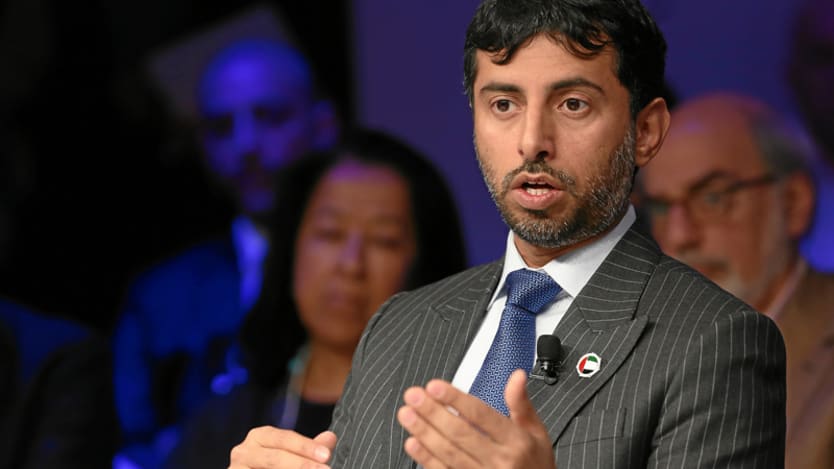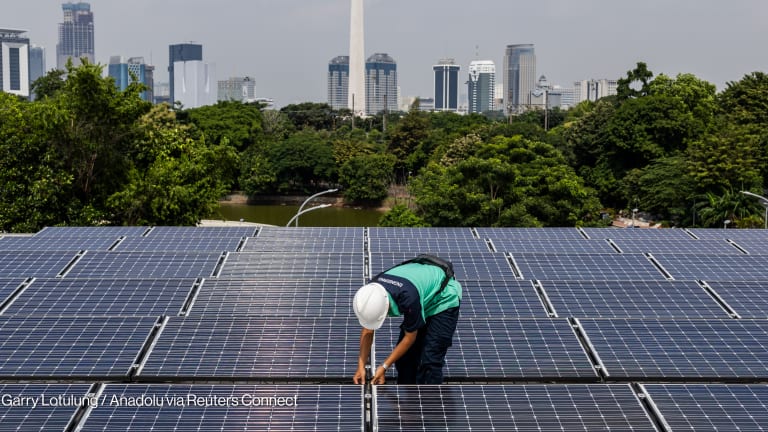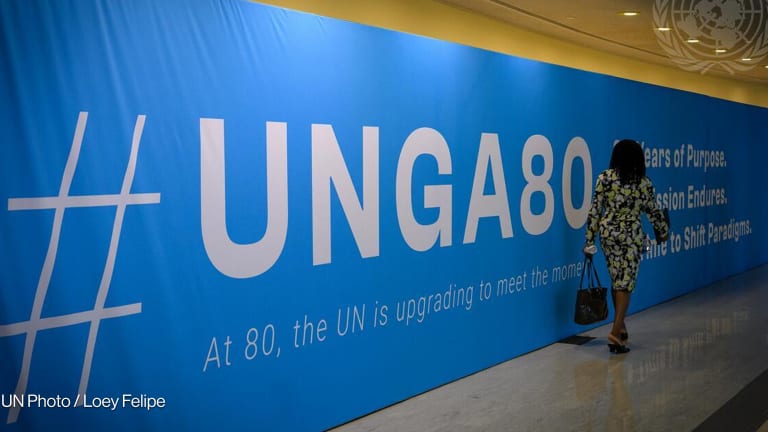
BRATISLAVA, Slovakia — Oil-rich United Arab Emirates is betting on another abundant natural resource to make it a clean energy leader: Solar, backed by increasingly cheaper and smarter technologies.
Rather than pouring subsidies into renewables, UAE is setting high targets for clean energy sources by 2050, on the assumption that the business case for technologies to store renewable energy and use it more efficiently will keep improving. The country secured the world’s lowest bid from developers seeking to build a solar power plant in Abu Dhabi in 2016, at 2.42 cents per kilowatt-hour from an Asian consortium. The 1,177-megawatt project is estimated to cost $870 million and will be the largest photovoltaic plant in the world once its completed, likely mid-2019. An Abu Dhabi company then drove the price down again with a bid in Saudi Arabia last year, at 1.79 cents per kilowatt-hour.
Now, UAE is looking to boost the renewable energy business in low-income, fossil fuel-reliant countries by creating funds for projects, including two $50 million aid programs for 16 Caribbean countries and for Pacific island nations.
As the renewable energy business matures, however, the key to sustainability is to encourage and support clean energy investments rather than relying on aid, and to let renewables compete head-on with other sources of energy, according to Suhail Al Mazrouei, UAE’s energy minister and president of the Organization of the Petroleum Exporting Countries.
“We think the right way to deal with the energy mix is to treat [forms] equally,” Al Mazrouei told the GLOBSEC 2018 Forum on foreign policy and security in Bratislava, Slovakia, last week. “If you subsidize gas, you are not fair to renewable energy. But it’s not fair, as well, to go and subsidize renewable energy.”
“If oil prices go up, if gas prices go up, it will make more sense for alternatives to flourish ... What made the revolution in renewable energy was the $100 [per barrel] price.”
— Suhail Al Mazrouei, UAE’s energy minister and OPEC presidentDevex spoke to Al Mazrouei on the sidelines of the conference about UAE’s efforts in low-income countries, the effects of the oil price spike on energy diversification, and the role of artificial intelligence in enabling the energy shift. The conversation has been edited for length and clarity.
Can you tell us about UAE’s energy targets and the role of technology in this, given that UAE became the first country in the world to appoint a minister for artificial intelligence last year?
The UAE is committed to the diversification of energy sources. We announced our strategy in 2017 calling for 50 percent clean energy by 2050, of which 44 percent is going to be renewable. That will be 44 gigawatts of installed capacity. We will be using gas power, around 38 percent, and nuclear as a baseload, around 6 percent, and we are looking at that energy mix to reduce CO2 [carbon dioxide] emissions by around 70 percent by 2050.
“We think artificial intelligence can help in the energy transformation, as we are targeting the maximization of efficiency, and we are building smart grids.”
—That is a massive transformation from where we are today. We think artificial intelligence can help in the energy transformation, as we are targeting the maximization of efficiency, and we are building smart grids, but we need to ensure that it is done in a safe manner to avoid cybersecurity risks.
[That’s against a backdrop of rising energy demand in the country.] Today we are at around 30 GW [of demand]. We are forecasting 100 GW by 2050. Definitely, artificial intelligence can increase efficiency and decrease the losses.
How are you encouraging renewable energy projects in other countries?
The UAE is host of the International Renewable Energy Agency, and through IRENA we are providing grants and some low-interest financing to renewable energy projects, especially solar, in many of the member countries. They apply to projects [that] provide business cases.
On top of that, we have provided grants for projects in some island states such as the Seychelles, as well as in Morocco and other countries. We are promoting the use of renewable energy and we think it is now commercially viable for these countries.
There’s a lot of talk in international climate change negotiations about the transfer of clean technology from wealthy to low-income countries. Is this something UAE is keen to do?
We are doing as much as we can to spread the technology, to increase renewable energy as a contribution to the energy mix in the Caribbean islands and other countries. By introducing those renewables, they see the benefits of it and they continue and grow on a commercial level.
We also have the Abu Dhabi Fund for Development, which is dedicating lots of help to developing nations and smaller countries. It has a program around smaller scale renewables, where we provide houses with renewable systems that can be off-grid. We have done projects in Afghanistan, in Egypt, and in some of those rural areas that do not have electricity, as well as Morocco.
As the United States, China, Europeans and others shift toward artificial intelligence and digitalization in energy — with technologies such as smart meters that track and respond to energy needs, and small-scale solar panels that allow individuals to produce and sell their own electricity — is there a risk that low-income countries will be left behind?
There is a risk, but there is hope as well. At the moment, many of those countries are paying the most expensive price per kilowatt-hour of electricity. It costs them 20 cents using diesel. When the commercial scale [for renewables] is reached, it will be around 3 or 4 cents. This is providing them with hope.
Where it’s risky, is if it continues to be given as grants, because you cannot give grants to all of those countries. Where it makes sense is where they’re already paying 20 cents and you could offer them [energy for] 4 cents — then you are providing them with a commercial solution.
How do you encourage developers to go out and build these projects?
Q&A: Countries need 'any kind' of modern energy, says OPEC aid boss
Renewable sources will eventually be the answer to energy poverty — but not yet, according to Suleiman Jasir Al-Herbish, head of OFID, the oil exporting countries' fund for international development.
That would require an international green fund. We are proud to have announced, two years ago, a green fund in Dubai, as part of the United Nations effort. [The fund offers low-interest loans to clean energy companies and invests directly in green projects, and reached $650 million in October.] And we have the OPEC Fund for International Development [which originally emerged from the Organization of Petroleum Exporting Countries.] You would be amazed how many countries they have helped with solar, not conventional energy.
Are you concerned then about U.S. President Donald Trump’s decision to hold back $2 billion from the U.N.’s Green Climate Fund?
I think every country in the world needs to participate in helping those [low-income] nations, especially major economies. You cannot force those countries to pay, but it is noble and it does make sense to help those nations.
Oil prices have spiked recently, hitting a four-year high of $80 per barrel last week. Does this delay the shift to clean energy in oil producing countries that feel more pressure to diversify when their export revenue falls?
The opposite — if oil prices go up, if gas prices go up, it will make more sense for alternatives to flourish. If the oil prices go down, you have a push. What made the revolution in renewable energy was the $100 price.
“I think you will need all forms of energy, it’s not going to be one facing the other.”
—As a minister, you are responsible for providing the cheapest form of electricity. If you have more gas, you can sell it, if there’s a market for it. But in your country, you will always deliver what makes sense from an affordability point of view — the cheapest and the most sustainable. If sustainable energy is cheaper and cleaner, then it’s the obvious choice.
I think you will need all forms of energy, it’s not going to be one facing the other. But within their strategy, each country needs to have a contribution from solar energy. I think a target of 40, 50 or 60 percent by 2050 is reasonable.








